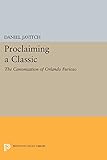Proclaiming a Classic : The Canonization of Orlando Furioso / Daniel Javitch.
Material type: TextSeries: Princeton Legacy Library ; 1166Publisher: Princeton, NJ : Princeton University Press, [2014]Copyright date: ©1991Edition: Course BookDescription: 1 online resource (216 p.)Content type:
TextSeries: Princeton Legacy Library ; 1166Publisher: Princeton, NJ : Princeton University Press, [2014]Copyright date: ©1991Edition: Course BookDescription: 1 online resource (216 p.)Content type: - 9780691606019
- 9781400861804
- 851.3
- PQ4569
- online - DeGruyter
- Issued also in print.
| Item type | Current library | Call number | URL | Status | Notes | Barcode | |
|---|---|---|---|---|---|---|---|
 eBook
eBook
|
Biblioteca "Angelicum" Pont. Univ. S.Tommaso d'Aquino Nuvola online | online - DeGruyter (Browse shelf(Opens below)) | Online access | Not for loan (Accesso limitato) | Accesso per gli utenti autorizzati / Access for authorized users | (dgr)9781400861804 |
Frontmatter -- CONTENTS -- ACKNOWLEDGMENTS -- INTRODUCTION -- Chapter One. THE SUCCESS OF ORLANDO FURIOSO IN THE SIXTEENTH CENTURY -- Chapter Two. THE LEGITIMATION OF ORLANDO FURIOSO -- Chapter Three. COMMENTARIES ON IMITATIONS IN ORLANDO FURIOSO -- Chapter Four. AFFILIATIONS WITH OVID'S METAMORPHOSES -- Chapter Five. CRITICAL RESPONSES TO NARRATIVE DISCONTINUITY IN ORLANDO FURIOSO -- Chapter Six. LIONARDO SALVIATI'S DEFENSE OF ORLANDO FURIOSO -- Chapter Seven. OTHER DEFENSES OF ORLANDO FURIOSO IN THE 1580s -- Chapter Eight. HARINGTON'S ENGLISH REFRACTIONS OF ORLANDO FURIOSO -- CONCLUSION -- NOTES -- PRIMARY WORKS CONSULTED -- INDEX
restricted access online access with authorization star
http://purl.org/coar/access_right/c_16ec
Despite its immediate popularity and its acclaim as a modern equal of the ancient epics, Ariosto's Orlando Furioso (published in its final version in 1532) was for learned readers a perplexing work: it mixed romance, epic, and lyric poetry, poked fun at its marvelous and outmoded chivalric matter, contained many interrupted narrative threads, and included base and lowborn characters. In exploring the literary debates involved in elevating the Furioso to the rank of a classic, Daniel Javitch maintains that this was the first work of modern poetry to provoke widespread critical controversy, and that the contestation played an inaugural role in the formation of the European poetic canon. The Furioso was seen by its early publishers to embody the formal, thematic, and functional characteristics of the highly esteemed epics of antiquity. Some critics, however, found in this poem new forms and functions that seemed better suited to modern times; still others denied the work any form of legitimacy. Showing how the Furioso became a locus upon which various and conflicting ideologies could be projected, Javitch argues that such a development offers the best indication of a poem's having achieved canonicity.Originally published in 1991.The Princeton Legacy Library uses the latest print-on-demand technology to again make available previously out-of-print books from the distinguished backlist of Princeton University Press. These editions preserve the original texts of these important books while presenting them in durable paperback and hardcover editions. The goal of the Princeton Legacy Library is to vastly increase access to the rich scholarly heritage found in the thousands of books published by Princeton University Press since its founding in 1905.
Issued also in print.
Mode of access: Internet via World Wide Web.
In English.
Description based on online resource; title from PDF title page (publisher's Web site, viewed 30. Aug 2021)


